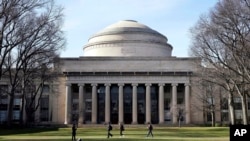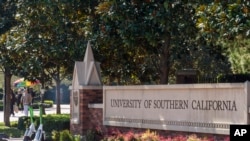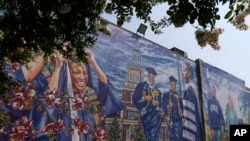Student Union
5 Articles That Might Change How You See the World
5. What Does it Mean to "Be American" As a Chinese Student?
The struggle to define yourself, and to decide how much your definition of self is in relation to others, is something everyone goes through in college. But when you're struggling to define yourself within another culture, as Qian has, it takes on a whole other dimension.
Waking from an alcoholic stupor after a party and walking in 5-inch-heels with my friends in the empty streets of Hong Kong at 3:00 am, I kept asking myself again and again, “Is this the life you want? If yes, why did you feel uncomfortable? If no, why do you have to continue this lifestyle you don’t actually enjoy?”
(Also make sure to take a look at Tara's thoughts about dating in America, the "relationship talk," and the fascinating differences in Chinese and American attitudes towards relationships)
4. Apetito and Acai Berries: Beauty and Weight in Zimbabwe and America
When being in America means redefining what it means to be "beautiful" and "healthy." Senzeni explores the obsession with weight in America, and back home in Zimbabwe.
During my freshman year, I watched with undisguised fascination as my friends would eat not to fill their stomachs, but to ensure that they had just barely met their daily calorie requirement. I also remember, vividly, watching helplessly as my American roommate’s face clouded over when I “complimented” her that she had gained weight (as you may have guessed, in America this is not a compliment).
3. Three perspectives on the meaning of "home"
Okay, I know this is cheating a bit, but Sebastian, Qian, and Olena each had SUCH unique perspectives on going home for the first time after spending months in America. Does living abroad mean changing your definition of home? Three different people gave three very different answers.
Does Gaining a New Home Mean Giving Up the Old One? - Sebastian
If I were to talk about the differences between Kansas and Santa Cruz I could write pages and pages about it, but here I’d rather say that those differences don’t seem to affect me anymore, whichever place I’m in.
A Fresh Perspective on My Two Homes: US and Ukraine - Olena
I had this weird feeling of belonging and at the same time not belonging to the place, which is my home country, for at least my first two weeks back. Almost nothing had changed in Ukraine, but after staying abroad for almost a year and a half my perception of many things changed...
Not the Home of My Memories, but Still Home - Qian
I have a 9-year-old cousin, once my sweetest little angel, who I watched grow up. This winter when I went back to Chengdu, I bought her several child-size-10 dresses as Christmas gifts. However, as soon as I met her at the airport, I realized those dresses were too small for her; she was already in 5th grade and in the year since I’d seen her had grown to almost five feet tall!
2. Don't Curb Your Enthusiasm: The Story That Inspired Me to Move Forward
Alex tells the story of his friend Diana, who faced a series of medical school rejections but kept fighting for her dream of working in medicine. If this doesn't inspire you to work towards your dreams, nothing will.
I was one of those inspired by her journey. Hearing her story led me to reflect on my own life. I realized that I have been holding on to so much and in effect it was holding me back. I wasn’t moving forward. Diana inspired me to say two things that I needed to hear myself say:
Dear past… thanks for all the lessons! Dear future… I’m ready!
1. Disability, Difference and Left-handedness in China and America
Is being left-handed something to be frowned upon, or just a difference like having blue eyes instead of brown? Are people with disabilities just as capable as the rest of us? Dandan struggles through those questions, and meets a professor who changes her perspective, in this fascinating piece.
My professors do their daily writing with their left hands. Unbelievable. They are not lunatics, but professors! My classmates do everything in their daily life with their left hands. Unbelievable. They are not lunatics, but incredibly talented people, as I’ve seen during in-class discussions, after-class group projects and many other activities!
Bonus: I didn't include this in my list because it got a shout out in yesterday's post of the most read items of the year, but you should read Simba's post about facing down negative stereotypes about Africans: On Being an African in the US: Navigating an Endless Web of Stereotypes
See all News Updates of the Day
Malaysian official: Schools can’t turn away from global tensions

Zambry Abdul Kadir, Malaysia’s higher education minister, said protests spreading across universities in the United States show that schools can’t ignore political tensions.
Helen Packer, reporting in Times Higher Education, said the minister reminded educators that universities are key in the development of leaders, individuals and societies. (April 2024)
Social media breaks are difficult, but necessary

Between online classes, maintaining social connections and working on projects, college students can have a hard time disengaging from the demands of technology.
In Florida International University’s PantherNOW, Ariana Rodriguez offers strategies for taking a break from social media. (April 2024)
- By Melos Ambaye
Many master's degrees aren't worth the investment, research shows
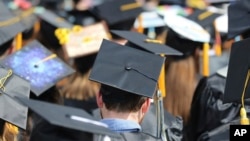
Nearly half of master's degrees have a negative financial return, according to new research by the Foundation for Research on Equal Opportunity, an economic research organization.
The study indicates that many graduate degree programs do not increase lifetime earnings enough to be worth it.
While 23% of bachelor’s degree programs yield a negative financial return on investment, 43% of two-year degrees and master’s degrees fail to deliver a return, according to the study by Preston Cooper, a senior fellow at FREOPP.
Cooper assessed the return on investment for 53,000 degree and certificate programs to determine whether a student’s lifetime earnings outweigh program costs and the risk of not completing their degree.
His findings show that a student’s field of study was the overriding indicator of return on investment at the undergraduate and graduate level.
Engineering, computer science and nursing bachelor’s degrees have high financial returns on investment, while programs in education, fine arts, psychology and English usually have low returns.
Graduate degrees in medicine and law tend to have strong payoffs. But a large share of master’s programs, including the MBA, frequently have low payoffs, according to Cooper.
Although workers with master’s degrees earn 16% more than those with only bachelor’s degrees, Cooper says the figure fails to account for students who had “higher preexisting earnings potential.”
“MBA students typically have high preexisting earnings potential, having often chosen high-ROI undergraduate majors such as finance and economics,” Cooper writes. “So the MBA adds little value on top of that.”
The study indicates that high starting salaries are predictors of high returns on investment. Degrees with starting salaries of $57,000 a year or more deliver the best lifetime returns.
But the return on investment of a degree can vary depending on the educational institution.
“Students interested in fields with low average pay can still find some schools that do well transforming those fields of study into high-paying careers,” Cooper writes.
The quality of an institution also matters, said William Tierney, professor emeritus of higher education at the University of Southern California.
“An MBA from Harvard is a likely ticket to a good job,” Tierney told VOA. “An MBA from the University of Phoenix, less so.”
But students pursue graduate programs for more than just financial reasons.
“Some degrees open up careers in fields that students may enjoy, such as in the performing arts,” Robert Kelchen, head of educational leadership at the University of Tennessee, Knoxville, told VOA.
“Others can help gain access to social networks or simply help students learn about a topic that is of interest,” Kelchen added.
Cooper told VOA that it might make sense for students in degree programs with low returns on investment to switch majors if they can still graduate on time.
He found the worst outcome for a student’s return on investment is dropping out of college “because they must pay for one or more years’ tuition and spend time out of the labor force.”
Lawmakers who fund higher education have a responsibility in ensuring “higher education delivers on its promise of economic mobility,” Cooper said.
Nearly a third of federal funding, including Pell grants and student loans, pays for higher education programs that fail to provide students with a return on investment, according to the study.
Cooper’s view is that “some schools should shut down low-ROI programs and reallocate institutional resources to programs with a better return.”
“There's definitely this narrative out there that higher education is always worth it, and you should always try to get that extra degree because it will increase your earnings,” he told VOA. “That's reinforced by colleges who make lofty promises regarding their graduate degree programs' outcomes, which all too often fall short.”
Harvard students end protest as school agrees to discuss Gaza conflict
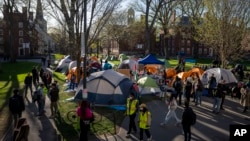
Protesters against the war between Israel and Hamas were voluntarily taking down their tents in Harvard Yard on Tuesday after university officials agreed to discuss their questions about the endowment, bringing a peaceful end to the kinds of demonstrations that were broken up by police on other campuses.
The student protest group Harvard Out of Occupied Palestine said in a statement that the encampment "outlasted its utility with respect to our demands." Meanwhile, Harvard University interim President Alan Garber agreed to pursue a meeting between protesters and university officials regarding the students' questions.
Students at many college campuses this spring set up similar encampments, calling for their schools to cut ties with Israel and businesses that support it.
The Israel-Hamas war began when Hamas and other militants stormed into southern Israel on October 7, killing some 1,200 people and taking 250 hostages. Palestinian militants still hold about 100 captives, and Israel's military has killed more than 35,000 people in Gaza, according to Gaza's Health Ministry, which doesn't distinguish between civilians and combatants.
Harvard said its president and the dean of the Faculty of Arts and Sciences, Hopi Hoekstra, will meet with the protesters to discuss the conflict in the Middle East.
The protesters said they worked out an agreement to meet with university officials, including the Harvard Management Company, which oversees the world's largest academic endowment, valued at about $50 billion.
The protesters' statement said the students will set an agenda that includes discussions on disclosure, divestment, reinvestment and the creation of a Center for Palestine Studies. The students also said that Harvard has offered to retract suspensions of more than 20 students and student workers and back down on disciplinary measures faced by 60 more.
"Since its establishment three weeks ago, the encampment has both broadened and deepened Palestine solidarity organizing on campus," a spokesperson for the protesters said. "It has moved the needle on disclosure and divestment at Harvard."
Chinese students report interrogations, deportations at US airports
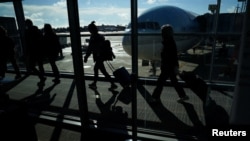
Academics from China are reporting increased scrutiny at U.S. airports, with valid visa holders being interrogated and turned away by Customs and Border Protection Agents.
Phones and laptops have been searched, and researchers have undergone extensive questioning about their work. One graduate student at Yale, who was midway through her PhD, was turned back at Dulles airport and banned from entering the U.S. for five years, according to The Guardian.








